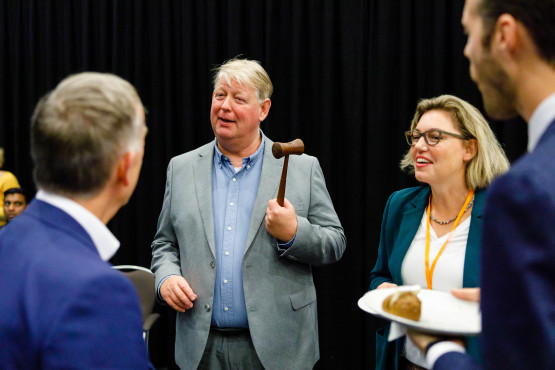The government, the education sector and the business community all say that we need to make better use of the potential of our workforce, and make sure that employees remain employable in the labour market of the future. But significant investment is required to do this properly. The government has therefore decided to allocate €167 million in funding to the Lifelong Development (LLO) Catalyser (see box) in 2022 and 2023. The money will come from the government’s Growth Fund, and is a financial injection that should give a significant boost to ‘lifelong learning’.
It is in our nature that we always want to keep learning, says Maaike Endedijk, Adjunct Professor in the field of professional learning and technology at the University of Twente. ‘And it’s also essential if we want to stay employable. But it’s very important to create conditions in which people have the opportunity to carry on learning. Employees have plenty of motivation when it comes to personal development – they just need the opportunities.’
LLO Catalyser
The national LLO Catalyser is the link between the business community, social organisations, education, government and professionals themselves for lifelong development initiatives. The Catalyser initiates and coordinates cooperation, provides new solutions where these are required, and directs resources to where they are needed in order to organise lifelong learning more effectively and efficiently at the national and regional levels. The LLO Catalyser is driving the continued development of lifelong learning. By means of this project, vocational colleges, universities of applied sciences and universities are giving a much-needed boost to lifelong development, both nationally and in the regions.
The challenges of the next decade
But how? The current system of lifelong learning shows that we are facing three challenges: we still do not have enough insight into the demand for workers in the future; we do not have the right supply of people to meet that demand; and our learning culture remains underdeveloped in the Netherlands.
It’s a complicated issue, explains Endedijk. ‘That’s why companies, organisations and knowledge institutions need to collaborate much more in this area.’ And that is not easy. After all, professionals learn in a completely different way than students. ‘You can give students a set curriculum that they need to complete. But professionals expect much more autonomy and the freedom to apply what they are learning straight away.’
Towards a more skills-oriented labour market
How do you ensure that current employees continue to learn and get the right kind of support? Certainly not by sending them on a five-year evening course, according to Endedijk. ‘We don't want to send people back to school. We need to design a curriculum that is attractive and flexible, and provide enough capacity to implement it together with our stakeholders. And that will require funding.’ According to Endedijk, we should think less in terms of a qualifications-oriented labour market and more in terms of a skills-oriented labour market.
A clearer picture of the target group
IJsbrand Haagsma, who is the Special Envoy for Public Affairs at the University of Twente, agrees with this. ‘The employees of the future will continue developing and moving with the times,’ he explains. Universities will play an important role in that respect. In Endedijk’s opinion, it is important for knowledge institutions to get a clearer picture of their target group. ‘Just setting up a programme and hoping that people will sign up is not enough. Universities are generally very discipline-oriented, but the issues and challenges that we face as a society are not.’


Maaike Endedijk and IJsbrand Haagsma
Future-proof
An important priority for the LLO Catalyser is that it will give everyone the opportunity to continue developing throughout their whole life. But according to Endedijk, that is not necessarily an individual process. ‘Alumni, for instance, can sit down with their team leader and work out which expertise the company will need in five years’ time. Many companies are facing the same challenges. If we can bring them together with the knowledge institutions, we should be able to come up with something that is future-proof.’
Twenty regions
This summer, more will be made known about how the lifelong learning will be structured in practice at the national level. ‘So in that sense, we are going to have to wait a while longer before we can actually start working on lifelong learning,’ says Haagsma. He explains that the country will be divided up into approximately twenty regions, and the LLO concept will then be put into practice at the regional level. ‘Ultimately, the idea is that the national LLO organisation will make transition deals with all the regions. Then we can match the supply with the demand.’
All hands on deck
So why does Endedijk believe in this project so strongly? ‘Look at what a challenging world we live in,’ she says. ‘We are going to need everybody to work on such complex issues.’ The people with the highest level of education are the ones who will be able to access lifelong learning the easiest. ‘But nobody should be left behind. Everyone needs to be able to participate. And the only way to achieve that is by investing in the development of all employees.’
Lecture halls, essays and exams might be a thing of the past, but the employees of the future will never stop learning.









